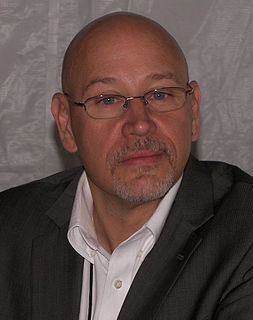A Quote by David Wroblewski
It is as true for the writer as for the reader that any novel worth its ink should be an experience first and foremost—not an essay, not a statement, not an orderly rollout of themes and propositions. All of which is to say: stories, too, are wild things.
Related Quotes
What is a novel? I say: an invented story. At the same time a story which, though invented has the power to ring true. True to what? True to life as the reader knows life to be or, it may be, feels life to be. And I mean the adult, the grown-up reader. Such a reader has outgrown fairy tales, and we do not want the fantastic and the impossible. So I say to you that a novel must stand up to the adult tests of reality.
I'm not sure if a writer should talk about themes. Themes arrive out of the deeper structure and concerns, but to me, the main thing is getting it down right, writing about specific characters in specific predicaments, and finding a way to be true to the story itself, not only in the first burst of draft but in the revision, too.
Now, as a reader, you shouldn't feel the decisions the writer makes about this DNA, or it would be boring beyond belief. But, as a writer, you're struggling to make these decisions. What should the title be? What's the first line? The point of view? And the struggle with the decisions is because you're trying to figure out WHAT IS THE NOVEL, WHAT IS THE NOVEL?
Introduce your main characters and themes in the first third of your novel. If you are writing a plot-driven genre novel make sure all your major themes/plot elements are introduced in the first third, which you can call the introduction. Develop your themes and characters in your second third, the development. Resolve your themes, mysteries and so on in the final third, the resolution.
I try to write things that can't be made into movies. My novels have thwarted many attempts to film them and I think that was true of the essay, too. If you'd actually tried to be true to the essay, it would have been, perhaps, boring. So taking that narrow little cast of characters and expanding it out, that was what was exciting about the project for me.
First and foremost, I consider myself a storyteller. And I'm endlessly fascinated with people, with what they do and why... and how they feel about it. Which means I'm interested in romance fiction. I was drawn to it, as both a reader and a writer, at the very beginning of my career. It's my kind of storytelling.
The book is finished by the reader. A good novel should invite the reader in and let the reader participate in the creative experience and bring their own life experiences to it, interpret with their own individual life experiences. Every reader gets something different from a book and every reader, in a sense, completes it in a different way.
We must be forewarned that only rarely does a text easily lend itself to the reader's curiosity... the reading of a text is a transaction between the reader and the text, which mediates the encounter between the reader and writer. It is a composition between the reader and the writer in which the reader "rewrites" the text making a determined effort not to betray the author's spirit.






































